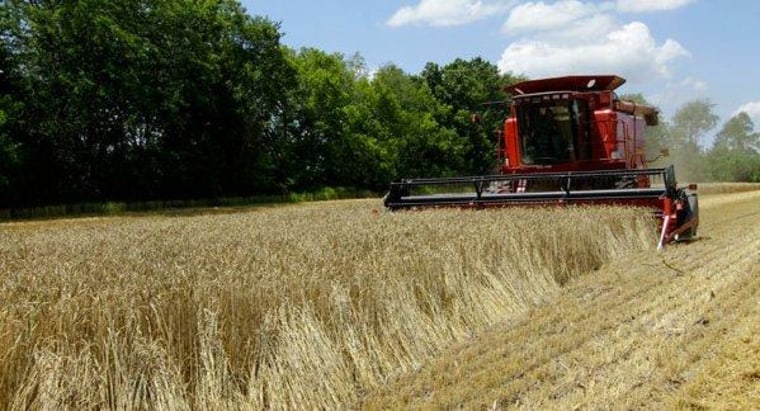Last year, the Senate approved a major piece of agricultural policy, commonly known as the "Farm Bill," only to see it die in the Republican-led House. This year, legislators are at it again.
The Senate approved a sweeping new farm bill on Monday that will cost nearly $955 billion over the next 10 years, the first step in a renewed attempt at passing legislation that will set the country's food and agriculture programs and policy. The bill, which finances programs as diverse as crop insurance for farmers, food assistance for low-income families and foreign food aid, passed with overwhelming bipartisan support, 66 to 27.
The roll call for the Senate bill is online here. I might quibble with the assertion that a 66-vote majority is "overwhelming," but it was certainly an unusually bipartisan vote -- though most Senate Republicans rejected the bill, 18 GOP senators broke ranks and joined the majority. (Insert joke here about how 66 is the new 90, given the prevailing political winds.)
As a substantive matter, there's quite a bit not to like in the bipartisan Senate version of the bill, at least from a progressive perspective. This year's Farm Bill achieves some savings by trimming unnecessary agricultural subsidies (that's good), but it also cuts conservation programs (that's bad). The legislation continues international food aid, but largely ignores the worthwhile reforms President Obama proposed in March.
Perhaps most importantly, though Sen. Ted Cruz (R-Texas) condemned the "unchecked growth of food stamp entitlements" in the bill, that's absurd -- the legislation cuts over $4 billion from food stamps over the next decade.
So why did Democrats support this bill? A few reasons, actually. First, they saw it as far better than the House version. Second, this year's Farm Bill maintains support for a variety of agricultural industries that exist in every part of the country, including a dairy market stabilization program that Dems like. And third, they saw these cuts as fairly modest and the price of getting a bipartisan bill that stood a chance of passing.
But as is usually the case, House Republicans have a very different approach to the legislation.
For example, the House GOP is demanding cuts to food stamps that are five times larger than the cuts approved by the Senate, while leaving agricultural subsidies largely intact. Mark Bittman recently published a good item on the big picture.
The House is proposing $20 billion in cuts to SNAP -- equivalent, says [David Beckmann, president of Bread for the World, a principled anti-hunger group], to "almost half of all the charitable food assistance that food banks and food charities provide to people in need."Deficit reduction is the sacred excuse for such cruelty, but the first could be achieved without the second. Two of the most expensive programs are food stamps, the cost of which has justifiably soared since the beginning of the Great Recession, and direct subsidy payments.This pits the ability of poor people to eat -- not well, but sort of enough -- against the production of agricultural commodities. That would be a difficult choice if the subsidies were going to farmers who could be crushed by failure, but in reality most direct payments go to those who need them least.
Quite right. The Senate bill is hardly great, but the House Republican version is needlessly, almost comically, cruel for no particular reason. Why? Apparently because GOP lawmakers, without so much as a hint of shame, are eager to redistribute wealth in the wrong direction -- punishing poor families and rewarding wealthy agricultural interests.
